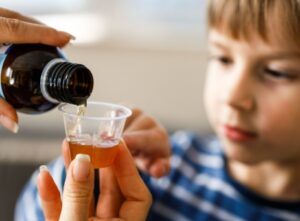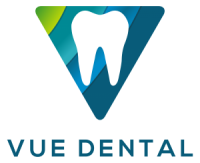It might surprise you, but something as common as cough syrup could be affecting your oral health more than you realize. Most of us don’t give it a second thought. You’re sick, your throat hurts, and you reach for that bottle of syrup without hesitation. But if you’ve been taking it regularly, or giving it to your kids often, there’s something you need to understand about how these medicines could be quietly harming your teeth and gums.
At Vue Dental Kyle, we’ve seen many cases where patients come in with tooth decay, not knowing their cough medicine might be one of the culprits. So let’s talk about why and how cough syrups can contribute to cavities, gum inflammation, and other dental problems, especially if you’re not taking precautions afterward.
Why Cough Syrups Can Be Bad for Your Teeth
Most over-the-counter cough syrups and liquid cold medications are packed with ingredients that are not very tooth-friendly. One of the biggest offenders is sugar. Sugar is often added to improve the taste, especially in children’s formulas. But even adult versions have sweeteners that can stick to your teeth and feed harmful bacteria in the mouth.

These bacteria produce acid after feeding on sugar, and over time, this acid wears away your tooth enamel. Enamel is the hard, protective outer layer of your teeth, and once it’s damaged, your teeth become more prone to cavities. If that wasn’t enough, some cough syrups are also acidic by nature, which just speeds up the damage.
Many of these syrups are thick and sticky, which means they don’t wash away easily with saliva. That sticky layer can linger on your teeth and gums, especially if you take it before bed. You’re probably not brushing your teeth again after taking nighttime medicine, right? That gives the syrup all night to do its dirty work.
How Cough Syrups Can Affect Your Gums
It’s not just the teeth that suffer. Your gums can also be irritated by the ingredients in some cough syrups. Alcohol, for example, is used in certain formulations to preserve the medicine. It can dry out your mouth, which may sound harmless, but dry mouth means less saliva, and saliva is essential for protecting your mouth from harmful bacteria.
A dry mouth creates the perfect environment for bacteria to thrive. This can lead to plaque buildup, gum irritation, and even gingivitis if it’s left unchecked. And if your immune system is already low because you’re sick, your gums may be more vulnerable to infection and inflammation.
Some patients who visit Vue Dental Kyle are shocked to learn that their sore or bleeding gums could be linked to their cold medicine habits. It doesn’t mean you shouldn’t take care of your cold—but it does mean you should be smart about how you protect your oral health during that time.

What About Sugar-Free or Natural Cough Syrups?
You might be thinking, “I buy sugar-free cough syrup, so I’m safe, right?” Not necessarily. Even sugar-free syrups can have other sweeteners that aren’t great for your teeth. Some artificial sweeteners may not directly cause decay, but they can still change the pH in your mouth or affect your oral microbiome in other ways.
And just because something is labeled “natural” doesn’t always mean it’s better for your dental health. Some natural syrups use honey or fruit juice concentrates as sweeteners, which are still high in natural sugars. So while the label may sound more appealing, the effect on your teeth can be quite similar.
What You Can Do to Protect Your Teeth While Taking Cough Medicine
Now that you know the risks, it doesn’t mean you should avoid cough syrup altogether when you’re sick. It just means you should take a few extra steps to protect your teeth and gums.
Try to take the syrup before a meal or before you brush your teeth so the sugars don’t sit on your teeth for too long. Rinse your mouth with water afterward to wash away the residue. If you’re taking syrup at night, wait about 20 to 30 minutes and then brush your teeth before bed. If brushing isn’t possible, at least rinse thoroughly with water or use a mouthwash that’s gentle but effective.
If you’re using syrup for your children, be especially mindful. Kids’ teeth are more vulnerable, and they may not always brush effectively. Encourage them to rinse after taking medicine, and talk to your dentist if you notice any signs of cavities or gum problems during or after cold season.
Don’t Ignore Subtle Changes in Your Mouth
Some people assume that tooth sensitivity, a little gum bleeding, or a dry feeling in the mouth is just temporary. But if it happens more frequently after cold or allergy season, it might be your cough medicine to blame. These signs should not be ignored.
Pay attention to how your mouth feels after taking medication. If you feel like your teeth are “fuzzy” or your gums sting, talk to your dentist. The team at Vue Dental Kyle can help assess whether your oral issues are being made worse by medications and guide you on how to minimize the damage.
The Bottom Line
It’s easy to forget about your dental health when you’re just trying to feel better from a cough or cold. But those few spoonfuls of syrup every day can add up, especially if you take them for several days or weeks at a time. Sugar, acids, alcohol, and stickiness are a bad combination when it comes to your teeth and gums.
Taking just a few small steps can prevent long-term damage. Always be mindful of what’s in your cough medicine, and give your mouth a little extra care during and after your illness. And of course, if you’re not sure how your current medications are affecting your oral health, don’t hesitate to check in with your local dental provider.
Your oral health deserves just as much attention as the rest of your body. If you’re in the Kyle area and have concerns about tooth decay, gum irritation, or even just keeping your mouth healthy during cold and flu season, the team at Vue Dental Kyle is here to help. Taking care of your smile doesn’t stop just because you’re sick—and with a little awareness, you can keep it protected no matter what.
